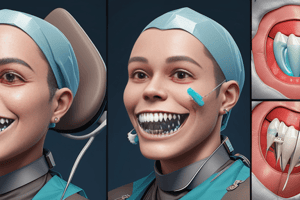Podcast
Questions and Answers
Which of the following describes the periods of dentition?
Which of the following describes the periods of dentition?
- Primary Dentition - only deciduous teeth are present; 6 months-6 years (correct)
- Permanent Dentition - only primary teeth are present; 12 years-rest of life
- Mixed Dentition - both deciduous and permanent teeth are present; 6 years-12 years (correct)
- All of the above
What is the first permanent tooth to erupt?
What is the first permanent tooth to erupt?
Mandibular first molar
Which is the last deciduous tooth to exfoliate?
Which is the last deciduous tooth to exfoliate?
Maxillary second molar
What does the term 'exfoliated' mean in dental anatomy?
What does the term 'exfoliated' mean in dental anatomy?
What is resorption in the context of deciduous teeth?
What is resorption in the context of deciduous teeth?
What are succedaneous teeth?
What are succedaneous teeth?
Flashcards
Primary Dentition
Primary Dentition
Only deciduous teeth are present, typically from 6 months to 6 years old.
First permanent tooth to erupt
First permanent tooth to erupt
The mandibular first molar.
Last deciduous tooth to exfoliate
Last deciduous tooth to exfoliate
The maxillary second molar.
Exfoliated (in dental context)
Exfoliated (in dental context)
Signup and view all the flashcards
Resorption (of deciduous roots)
Resorption (of deciduous roots)
Signup and view all the flashcards
Succedaneous teeth
Succedaneous teeth
Signup and view all the flashcards
Study Notes
Dentition Periods
- Primary Dentition: Lasts from 6 months to 6 years, featuring only deciduous (baby) teeth.
- Mixed Dentition: Spanning from 6 to 12 years, characterized by the presence of both deciduous and permanent teeth.
- Permanent Dentition: Begins at 12 years and extends throughout life, where only permanent teeth are present.
Eruption and Exfoliation
- The first permanent tooth to erupt is typically the mandibular first molar.
- The last deciduous tooth to exfoliate is usually the maxillary second molar.
- Exfoliation refers to the shedding of deciduous teeth, which allows permanent teeth to erupt into the designated space.
Tooth Resorption
- Resorption: A natural process that involves the dissolution of deciduous roots, facilitating their exfoliation to make way for permanent teeth.
Succedaneous Teeth
- Succedaneous Teeth: A total of 20 permanent teeth that replace exfoliated deciduous teeth, referred to as "succeeding" teeth.
- Notably, the only permanent teeth that are not succedaneous are the molars; premolars succeed the deciduous molars.
Studying That Suits You
Use AI to generate personalized quizzes and flashcards to suit your learning preferences.




